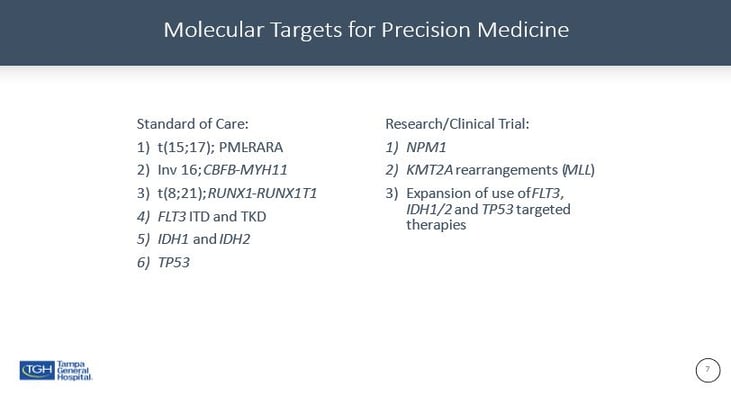Advances in next-generation sequencing have improved our understanding of the complexity and molecular heterogeneity of acute myeloid leukemia (AML). AML is a stem cell malignancy characterized by arrested differentiation, which leads to suppressed hematopoiesis.
According to SEER Cancer Statistics, the five-year relative survival rate for AML is 29.5%.
In a recent virtual presentation, Dr. David Swoboda of the TGH Cancer Institute emphasized the important role that mutations and cytogenetics play in AML, aiding prognosis, diagnosis, treatment decisions, and monitoring minimal residual disease (MRD). He highlighted the standard of care molecular targets and touched upon research and clinical trial targets.

David M. Swoboda, MD
Tampa General Hospital (TGH) Cancer Institute, Tampa, Florida
The Value of NGS Mutational Data: Informing Therapeutic Decisions and Optimizing Outcomes
Dr. Swoboda shared his diagnostic algorithm for AML and results from his pooled analysis of large phase 3 trials of patients with core-binding factor leukemias, which can be identified by the presence of specific DNA translocations. For this cohort of cases in the study, Dr. Swoboda evaluated a newer therapy, Gemtuzumab Ozogamicin (GO), a humanized anti-CD33 mAb conjugated to a chemotherapy agent. The result was a significant 20% improvement in five-year survival rates.
Dr. Swoboda’s research dramatically illustrates the value of molecular diagnostics in identifying the specific mutations that can inform therapy selection to improve patient outcomes and survival rates.

Current Challenges in AML Treatment
Given the importance of molecular data in identifying AML subtypes and informing optimal therapy, Dr. Swoboda pointed out the challenges that clinicians like him face when NGS data may not be available for 2 weeks. In the current paradigm, patients with AML are discharged to undergo treatment in an outpatient setting while they wait for the NGS results. Once the NGS data is available, the patient is readmitted and treatment can finally begin. Unfortunately, these treatment delays pose added health risks, prolong hospital stays, and compromise patients’ quality of life and outcomes.
Diagram: AML hospital flow comparison
In contrast, Dr. Swoboda emphasized how rapid NGS can transform the paradigm, empowering clinicians with the data they need by Day 2, enabling treatment as early as Day 3. In this new paradigm, patient care is optimized, while the hospital stay and associated costs are reduced—a win-win for both patients and providers.
Rapid NGS: Transforming the AML Treatment Paradigm
Future Perspective
With rapid NGS, Dr. Swoboda envisions a new standard of care for AML and other diseases. He concludes that swiftly assigning patients to a specific genotype/immunophenotype and selecting the best precision-based strategy for each patient, will ultimately enhance outcomes and hospital efficiencies.
“The continued development of targeted molecular therapies is changing how we treat AML in the upfront and rapid setting…Critical as we move forward into this era of precision oncology in AML is the need for rapid sequencing of AML patients to identify therapeutic molecular targets. So, understanding the disease’s genetic makeup in AML will allow us to provide the best care and clinical outcomes while also maximizing the utilization of our hospital resources.” - Dr. Swoboda
Learn more by viewing Dr. Swoboda's full presentation.
Precision medicine is rapidly changing our understanding of cancer research and treatment decisions. These breakthrough, personalized treatments hold promise even for patients with historically hard-to-treat diseases, like lung or breast cancer. But
In his recent talk at OncomineWorld 2023, Dr. Bekim Sadikovic presented a strong, evidence-based argument for frontline next-generation sequencing (NGS) in myeloid malignancy testing.
Bekim Sadikovic PhD, DABMGG, FACMGProfessor, Research Chair, and...
In a recent Association for Molecular Pathology (AMP) workshop, Dr. Cecilia Yeung shared how her lab is implementing rapid next-generation sequencing (NGS) to help advance hemato-oncology research and expand access to underserved populations.
...